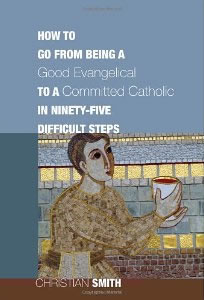Book Notes
 Christian Smith, How to Go from Being a Good Evangelical to a Committed Catholic in Ninety-Five Difficult Steps (Eugene: Cascade Books, 2011), 205pp.
Christian Smith, How to Go from Being a Good Evangelical to a Committed Catholic in Ninety-Five Difficult Steps (Eugene: Cascade Books, 2011), 205pp.
Christian Smith, a sociologist at Notre Dame, was born and raised an evangelical, but on April 24, 2010 he and his wife converted to Catholicism. His book tries to show how and why American evangelicals should follow his lead, and does so with the zeal of a new convert. His title, of course, is a clever jab at Luther's ninety-five theses, and it points to a serious charge. In his view, the Reformation is over, and "people who insist on keeping the Reformation going are acting rather foolishly" (174). This is likewise a jab at his Notre Dame colleague and historian Mark Noll, who published a book called Is the Reformation Over? (2005) that assessed Catholic-Evangelical dialogue. Protestants bear the brunt of ecclesiastical blame in Smith's view: "The Reformation does not call for celebration. It calls for sorrow, repentance, and reconciliation" (111).
Smith's appeal is built around Thomas Kuhn's famous book about how "paradigm shifts" occur when science accumulates too many anomalies for which reigning theories cannot account. He raises numerous issues that, in his mind, evangelicalism cannot account for as well as Catholicism. Some of his points are well taken, like the issue of inerrancy or the presence of the true church for fifteen hundred years before Protestantism even existed. Others sound like special pleading, like his take on the Assumption of Mary and her Immaculate Conception, both of which were invoked by papal infallibility. Convinced Protestants might find his take on "separated brethren" as too optimistic, presumptuous and patronizing. Nor is he above proof-texting (a favorite evangelical practice), as with thesis #66 on transubstantiation. Many readers will doubt his sense of a positive future regarding women in Catholicism or clerical celibacy. Complaints about boring sermons, lame liturgy, or fallen pastors can be argued both ways.
Smith writes in an informal, personal, and unapologetic style. He's a well-informed if opinionated scholar, and he knows that almost all the issues he raises are complicated and require considerable study (like he did before his conversion); this book alone is hardly sufficient, as he would acknowledge. He makes a few passing references to Eastern Orthodoxy, which has also attracted converts from evangelicalism (and even the scholars Richard Swineburn and Jaroslav Pelikan) because of similar theological and historical claims. There's one mention of Oriental or Syriac believers, which is to say that the quest for Christian unity goes far beyond Catholics and evangelical rapprochement. Smith's book is an articulate and welcomed addition to the growing literature on evangelical-Catholic dialogue, but I'm not sure its strident polemic will attract many new converts.


